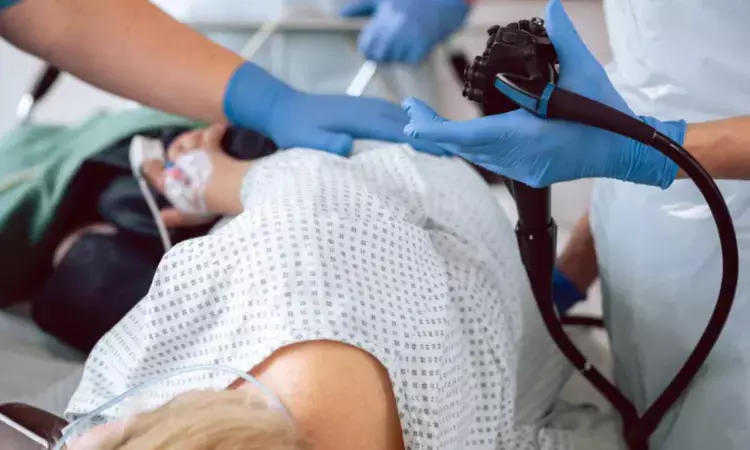- Home
- Medical news & Guidelines
- Anesthesiology
- Cardiology and CTVS
- Critical Care
- Dentistry
- Dermatology
- Diabetes and Endocrinology
- ENT
- Gastroenterology
- Medicine
- Nephrology
- Neurology
- Obstretics-Gynaecology
- Oncology
- Ophthalmology
- Orthopaedics
- Pediatrics-Neonatology
- Psychiatry
- Pulmonology
- Radiology
- Surgery
- Urology
- Laboratory Medicine
- Diet
- Nursing
- Paramedical
- Physiotherapy
- Health news
- Fact Check
- Bone Health Fact Check
- Brain Health Fact Check
- Cancer Related Fact Check
- Child Care Fact Check
- Dental and oral health fact check
- Diabetes and metabolic health fact check
- Diet and Nutrition Fact Check
- Eye and ENT Care Fact Check
- Fitness fact check
- Gut health fact check
- Heart health fact check
- Kidney health fact check
- Medical education fact check
- Men's health fact check
- Respiratory fact check
- Skin and hair care fact check
- Vaccine and Immunization fact check
- Women's health fact check
- AYUSH
- State News
- Andaman and Nicobar Islands
- Andhra Pradesh
- Arunachal Pradesh
- Assam
- Bihar
- Chandigarh
- Chattisgarh
- Dadra and Nagar Haveli
- Daman and Diu
- Delhi
- Goa
- Gujarat
- Haryana
- Himachal Pradesh
- Jammu & Kashmir
- Jharkhand
- Karnataka
- Kerala
- Ladakh
- Lakshadweep
- Madhya Pradesh
- Maharashtra
- Manipur
- Meghalaya
- Mizoram
- Nagaland
- Odisha
- Puducherry
- Punjab
- Rajasthan
- Sikkim
- Tamil Nadu
- Telangana
- Tripura
- Uttar Pradesh
- Uttrakhand
- West Bengal
- Medical Education
- Industry
Early Sigmoidoscopy Improves Acute Severe Ulcerative Colitis Outcome

A recent study published in Journal of Crohn's and Colitis has shed light on the benefits of early sigmoidoscopy in patients hospitalized with acute severe ulcerative colitis (ASUC). Spanning from January 2012 to November 2021, the study by Shreyak Sharma and team aimed to assess whether the timing of sigmoidoscopy affected relevant clinical outcomes in this specific patient cohort.
The research, involving 112 ASUC patients who underwent sigmoidoscopy, revealed that performing the procedure within 72 hours of admission significantly improved clinical outcomes compared to delayed sigmoidoscopy, defined as occurring more than 72 hours after admission.
Key findings from the study indicated that patients who received early sigmoidoscopy experienced numerous advantages over their delayed-sigmoidoscopy counterparts. Notably, the early group had a substantial reduction in the cumulative days of intravenous corticosteroid (CS) use, with an average of 4.5 days compared to 9.2 days in the delayed group (P < .001). Additionally, the early sigmoidoscopy patients had significantly shorter hospital stays, averaging 6.4 days, in contrast to 19.3 days for the delayed group (P < .001).
Moreover, time to infliximab (IFX) rescue, a crucial measure of treatment efficacy, was markedly improved in patients who received early sigmoidoscopy (3.5 days) compared to those with delayed sigmoidoscopy (6.4 days) (P = .004).
While colectomy rates were slightly higher in the delayed sigmoidoscopy group (28%) than the early sigmoidoscopy group (17%), the difference was not statistically significant (P = .23). However, the study identified a concerning trend – longer time to sigmoidoscopy was associated with a 16% increased risk of colectomy, underlining the importance of timely intervention in ASUC patients (HR = 1.16, P = .002).
The results of this well-characterized cohort provide valuable insights into the benefits of early sigmoidoscopy in managing ASUC, particularly in terms of reducing CS usage, hospital stays, and the need for colectomy. Such findings are vital in guiding clinical practices and optimizing patient outcomes in the management of ASUC.
Reference:
Sharma, S., Li, D. K., Levine, L. J., Chaar, A., McMillan, C., Gaidos, J. K. J., Proctor, D. D., & Al-Bawardy, B. (2023). Early Flexible Sigmoidoscopy Improves Clinical Outcomes in Acute Severe Ulcerative Colitis. In Crohn’s & Colitis 360 (Vol. 5, Issue 3). Oxford University Press (OUP). https://doi.org/10.1093/crocol/otad032
Neuroscience Masters graduate
Jacinthlyn Sylvia, a Neuroscience Master's graduate from Chennai has worked extensively in deciphering the neurobiology of cognition and motor control in aging. She also has spread-out exposure to Neurosurgery from her Bachelor’s. She is currently involved in active Neuro-Oncology research. She is an upcoming neuroscientist with a fiery passion for writing. Her news cover at Medical Dialogues feature recent discoveries and updates from the healthcare and biomedical research fields. She can be reached at editorial@medicaldialogues.in
Dr Kamal Kant Kohli-MBBS, DTCD- a chest specialist with more than 30 years of practice and a flair for writing clinical articles, Dr Kamal Kant Kohli joined Medical Dialogues as a Chief Editor of Medical News. Besides writing articles, as an editor, he proofreads and verifies all the medical content published on Medical Dialogues including those coming from journals, studies,medical conferences,guidelines etc. Email: drkohli@medicaldialogues.in. Contact no. 011-43720751


